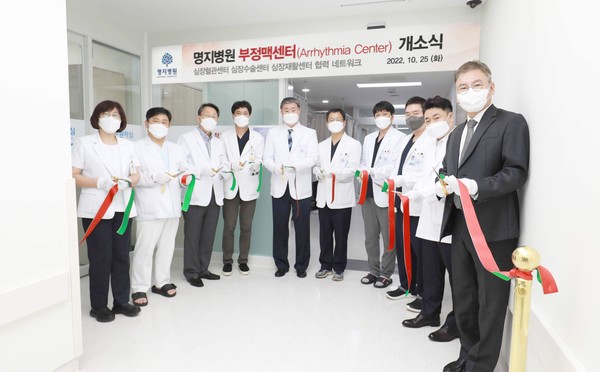Myongji Hospital said Wednesday it opened the first arrhythmia center in northern Gyeonggi Province.

The hospital plans to provide specialized diagnosis and treatment of arrhythmia, a major cause of sudden death among cardiovascular diseases.
A heart arrhythmia happens when the electrical signals that coordinate the heart's beats do not work properly. The faulty signaling causes the heart to beat too fast (tachycardia), too slow (bradycardia), or irregularly.
According to the hospital, the arrhythmia center, led by Professor Hwang Eui-seok, has set up a cooperative network with a variety of specialized medical staff working at Myongji Hospital's cardiac surgery center, cardiac rehabilitation center, and the department of anesthesiology.
The arrhythmia center adopted a total care system that systematically manages the entire cycle, from drug treatment to surgery, rehabilitation, and follow-up management. A doctor can comprehensively judge the patient's condition based on age, underlying disease, and the presence or absence of symptoms.
Also, the center has placed a wearable electrocardiogram, which supplements the limitations of the existing 24-hour Holter test, and GE Innova IGS 5, the latest cardiac angiography.
Notably, Myongji Hospital has been expanding balloon cryoablation surgery for the treatment of arrhythmias and atrial fibrillation after introducing the method last March for the first time in northwestern Gyeonggi Province.
Unlike the existing radiofrequency catheter ablation (RFCA), which electrically blocks the pulmonary vein that causes tachycardia using high-frequency energy, balloon cryoablation is a treatment that blocks the pulmonary vein by rapidly cooling the pulmonary vein entrance to minus 40 to minus 50 degrees.
Balloon cryoablation cuts the procedure time by less than half compared to RFCA and can be completed within two hours, greatly reducing the risk of complications, accelerating recovery, and improving patient satisfaction.
"Atrial fibrillation and arrhythmia, the main causes of stroke, dementia, and sudden cerebral infarction, require prompt and accurate diagnosis and treatment," Professor Hwang said. "To provide more professional and high-quality treatment, we have opened an independent arrhythmia center focusing on arrhythmia diseases."
Myongji Medical Foundation Director Hong Sung-hwa also said, "By opening an arrhythmia center equipped with excellent medical staff and equipment, we have an integrated treatment system that encompasses heart disease diagnosis, surgery, and rehabilitation."
The hospital will do its best to operate a fast-track system so as not to miss the treatment opportunity for arrhythmias, Hong added.

